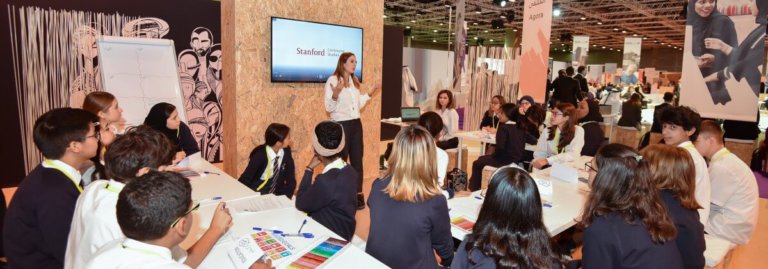
At the recently held World Innovation Summit for Education (WISE) 2019 in Doha, Qatar, educators and students were invited to rediscover the role of education and what it means to be human.
Here were six great lessons for students shared by the business community:
1. Reinvention is key
Co-founder and executive director of alternative business school Groundswell Social Ventures, Gilad Babchuk, spoke about the value of adaptability and entrepreneurial skills: “We should be repurposing ourselves every few years and constantly reinventing ourselves in order to live more productive and meaningful lives.”
Members of the business community said there was an urgent need to redefine the purpose of education so students leave ready for a fast-changing world.
“Reinventing the self is essential for the future of work. That ability to deal with challenges and to preserve our mental balance in unfamiliar situations. It’s not about reinventing products – it’s about reinventing ourselves,” added Sheryl Foo, APAC & MEA director at Vertech Capital.
2. Define success for yourself
Speaking about his hometown in Vancouver, Babchuk noted the importance of “liberating people to define success for themselves – at the moment that’s typically defined by someone else. In Canada, by 2022, 45 percent of the country is likely to be self-employed.”
Foo noted that every student has the capacity to be an entrepreneur or a changemaker. “Being an entrepreneur is about transforming nothing into something. If you’re transforming something in your ecosystem, then you’re already an entrepreneur.”
3. Relationships drive change
David Osher, vice president of the American Institute for Research discussed the importance of character skills.
“It’s relationships that drive change and learning. If we want people to succeed and thrive we have to teach people to connect and interact with each other. Don’t presume to know everything and when you’re talking to people, use and understand their local context.”
4. Intelligence is not so clear cut
Jeremy Lamri, head of Innovation at JobTeaser challenged popular views on intelligence and discussed the correlation, or lack of, when it comes to intelligence and performance.

Human skills will be increasingly important in the age of automation. Source: Tobias Schwarz/AFP
“The 21st-century view of intelligence is logical and mathematical but this type of thinking is really only relevant to about 40 percent of the population but we reference it all the time. It is those who can use words to be interpersonal and communicative that survive,” said Lamri.
“Natural intelligence is the ability to distinguish different forms and the ability to ask questions about everything but yourself.”
5. Artificial Intelligence (AI) cannot replace all human skills
By and large, the mantra from business leaders was that human skills will prevail in a world where, according to a 2017 report by the McKinsey Global Institute, digitisation, automation, and advances in AI could make up to 375 million workers obsolete by 2030.
Emphasising the importance of soft skills, the ability to manage change and anticipate new market trajectories to seize and create value, was Patrick Brothers of data company HolonIQ.
“AI will not solve a lack of creativity. AI can help you with facts but it won’t create the spark because it’s people who make interesting decisions not machines.”
6. Your success is defined by will
Lastly, Babchuk, who mentors students and young entrepreneurs and has helped set up various innovative schools offered a refreshing outlook on success and performance.
“The future is defined by will – not skill,” he said. “Your will is your value, your passion, strength and unique perspective.”
Liked this? Then you’ll love…
This ice cream empire can teach business grads valuable things about soft skills
MBA graduates from this US business school are paid the most







